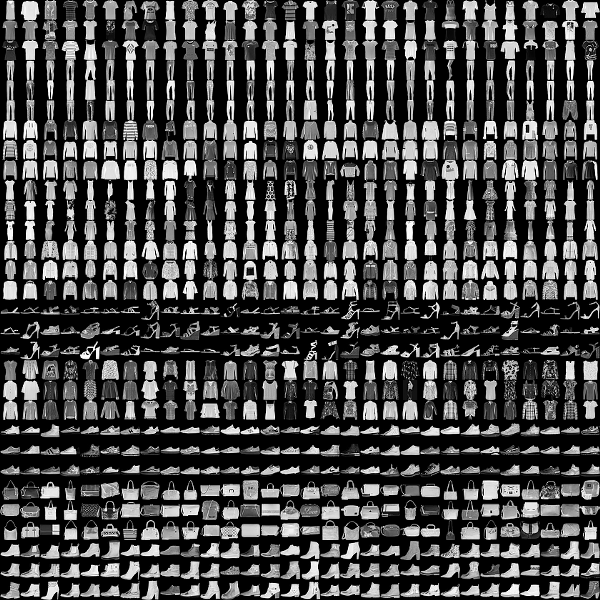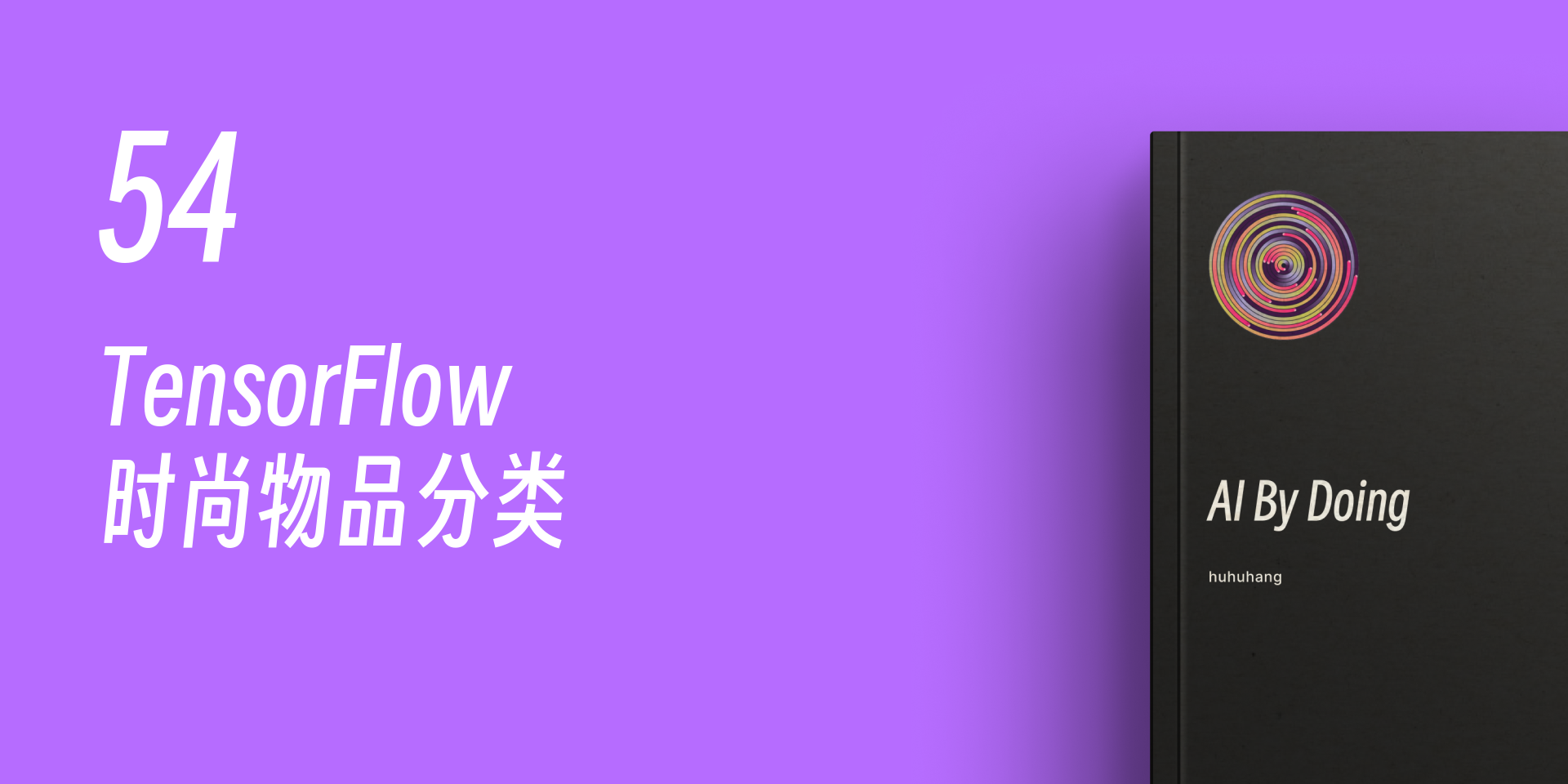55. TensorFlow Fashion Item Classification#
55.1. Introduction#
In this challenge, you will independently complete an open classification prediction exercise. You need to use the Fashion-MNIST fashion item dataset and build a reasonable DNN network through TensorFlow Keras.
55.2. Key Points#
Building neural networks with Keras
Normalization of grayscale data
Flatten and Dropout layers

The Fashion-MNIST fashion item dataset contains 70,000 images, including 60,000 grayscale images of 28x28 pixels for the training set and 10,000 images of the same specification for the test set, with a total of 10 fashion item labels.
Category |
Description |
Chinese |
|---|---|---|
0 |
T-shirt/top |
T-shirt/top |
1 |
Trouser |
Trouser |
2 |
Pullover |
Pullover |
3 |
Dress |
Dress |
4 |
Coat |
Coat |
5 |
Sandal |
Sandal |
6 |
Shirt |
Shirt |
7 |
Sneaker |
Sneaker |
8 |
Bag |
Bag |
9 |
Ankle boot |
Ankle boot |
Next, we directly load this dataset using TensorFlow.
import tensorflow as tf
(X_train, y_train), (X_test, y_test) = tf.keras.datasets.fashion_mnist.load_data()
# 对特征进行标准化处理
X_train = X_train / 255
X_test = X_test / 255
X_train.shape, X_test.shape, y_train.shape, y_test.shape
Downloading data from https://storage.googleapis.com/tensorflow/tf-keras-datasets/train-labels-idx1-ubyte.gz
29515/29515 [==============================] - 0s 7us/step
Downloading data from https://storage.googleapis.com/tensorflow/tf-keras-datasets/train-images-idx3-ubyte.gz
26421880/26421880 [==============================] - 2s 0us/step
Downloading data from https://storage.googleapis.com/tensorflow/tf-keras-datasets/t10k-labels-idx1-ubyte.gz
5148/5148 [==============================] - 0s 0us/step
Downloading data from https://storage.googleapis.com/tensorflow/tf-keras-datasets/t10k-images-idx3-ubyte.gz
4422102/4422102 [==============================] - 1s 0us/step
((60000, 28, 28), (10000, 28, 28), (60000,), (10000,))
After reading the data, since it is grayscale images, we can
directly normalize it by dividing by 255. In addition, we
can also use methods such as
tf.keras.utils.normalize
provided by TensorFlow to normalize the data. After that, we
visualize the first sample of the training set to check:
from matplotlib import pyplot as plt
%matplotlib inline
plt.imshow(X_train[0], cmap=plt.cm.gray)
plt.title(y_train[0])
Next, we are going to build a DNN network with two hidden layers to complete image classification.
Exercise 55.1
Open Challenge
Challenge: Use TensorFlow Keras to build a fully-connected artificial neural network (ANN) with two hidden layers for fashion item classification.
Requirements: You are free to choose to build using the Keras sequential model or the functional model. You can freely define the neural network structure, loss function, optimization method, etc.
We recommend using the following network, and you can also customize and modify it.

The layers used in the recommended network above are:
-
tf.keras.layers.Flatten: Used to flatten the original input matrix of \(28 \times 28\) into a row vector. 🔗 -
tf.keras.layers.Dropout: In the fully-connected layer, neurons are directly disconnected with a certain probability to prevent overfitting. 🔗
You need to learn these two layers through the official documentation and learn to complete the construction and training of the network by combining the knowledge from the previous experiments.
Solution to Exercise 55.1
model = tf.keras.models.Sequential()
model.add(tf.keras.layers.Flatten(input_shape=(28, 28)))
model.add(tf.keras.layers.Dense(units=512, activation='relu'))
model.add(tf.keras.layers.Dropout(0.2))
model.add(tf.keras.layers.Dense(units=128, activation='relu'))
model.add(tf.keras.layers.Dropout(0.2))
model.add(tf.keras.layers.Dense(units=10, activation='softmax'))
model.compile(optimizer='adam',
loss='sparse_categorical_crossentropy',
metrics=['accuracy'])
model.fit(X_train, y_train, batch_size=64, epochs=5,
validation_data=(X_test, y_test))
Finally, the challenge expects to obtain the training set accuracy and test set accuracy results under a reasonable number of iterations, preferably close to 90% or higher. An example is as follows:
Expected output
Train on 60000 samples, validate on 10000 samples
Epoch 1/5
60000/60000 [==============================] - loss: 0.3098 - acc: 0.8856 - val_loss: 0.3455 - val_acc: 0.8776
Epoch 2/5
60000/60000 [==============================] - loss: 0.2981 - acc: 0.8891 - val_loss: 0.3352 - val_acc: 0.8784
Epoch 3/5
60000/60000 [==============================] - loss: 0.2885 - acc: 0.8914 - val_loss: 0.3346 - val_acc: 0.8741
Epoch 4/5
60000/60000 [==============================] - loss: 0.2802 - acc: 0.8942 - val_loss: 0.3349 - val_acc: 0.8808
Epoch 5/5
60000/60000 [==============================] - loss: 0.2738 - acc: 0.8982 - val_loss: 0.3197 - val_acc: 0.8851
Related links

